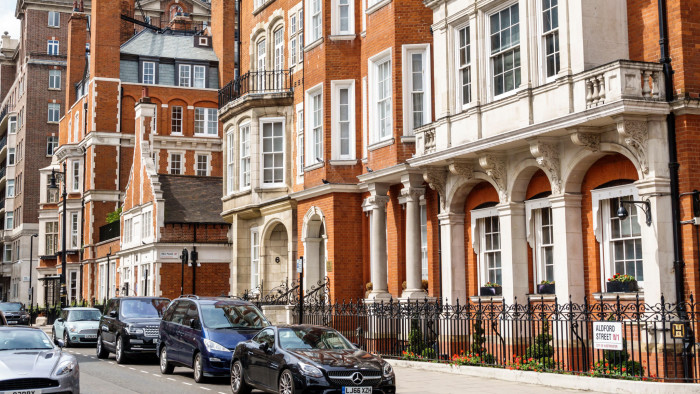Is there a way to keep our London home in the family?

Roula Khalaf, Editor of the FT, selects her favourite stories in this weekly newsletter.
My parents were lucky enough to buy a house in a central part of London back in the 1970s. If sold, it would fetch in the upper reaches of single-digit millions.
Having grown up in the house myself and now raising my son there with my parents who are now in their seventies, I wondered if we should be doing something to hedge against inheritance taking the house from us?
I am in favour of inheritance taxes to ensure balanced societies. However, I would love to keep the house in the family. We aren’t cash rich by any means, but would like to continue living in our community.
Christopher Groves, a partner at law firm Withers, says this is an enviable problem indeed, but while your property’s value may be at the upper end of the scale this is a problem that affects a broad swath of middle England, with many looking to preserve their family home for their children.
This has led to a good deal of tax planning over the years. In response, successive governments have introduced anti-avoidance legislation, principally the gifts with reservation of benefit rules and the pre-owned asset tax. The general aim of both of these pieces of legislation is to prevent taxpayers giving away an interest in their home to avoid inheritance tax, while continuing to live there rent free.

Generally speaking, government has been successful in this endeavour and many schemes designed to avoid inheritance tax on family homes have been counteracted over the years. However there are still a couple of options that you may wish to consider to achieve your aim.
First, your parents could gift the property to you and rent all or part of it back. However, this is not an easy option as a market rent must be paid at all times. In central London, this is likely to be extremely costly. Even if your parents could afford to pay this for the rest of their lives, you would have an income tax bill to factor in.
Alternatively, there is an exemption that would apply if your parents were to give you a share in the home and you all continued to occupy it, with each of you paying an appropriate share of the running costs. In those circumstances, your parents are not regarded as reserving a benefit in the share given away and it would not be subject to inheritance tax upon their deaths. The gift to you would be a potentially exempt transfer for inheritance tax purposes. It would not be taxable, so long as your parents live more than seven years after the share is given, so this partial solution will also take some time to be fully effective.
Some companies offer products that claim to be able to protect family homes from inheritance tax, but these should be resisted as they may well not be effective now and, even if they are, may well not be at your parents’ death.
Lucy Brennan, partner in the private wealth group at Saffery Champness, says one suggestion would be to divide the house into shares. There is an anti-avoidance provision preventing people from gifting an asset and continuing to benefit from it (known as a gift with reservation of benefit). As your parents are living there, by gifting the whole house to you and continuing to live there they would be caught by these rules and the property would remain part of their estates at death — unless they paid you a market value rent.

However, it is perfectly legitimate for you to own part of the house as this is your residence too. If, say, 50 per cent of the house was gifted down to you, provided your parents survived for seven years there would be no inheritance tax to pay on this. This way, a large amount of value has been legitimately passed out of their estates with no IHT charge.
An added benefit may be that if their joint estate falls below £4.7m, there would be an element of the new residence nil-rate band that could be applied to their estate. Although half of the property’s value would still be chargeable to IHT upon the last death, at least some of it would be exempt.
It may be more relevant for you to have a larger or smaller share proportion depending on usage. Care should be taken to avoid the gift with reservation of benefit provisions and each party should continue to contribute their fair share of bills and household expenses as appropriate to their share.
A review for capital gains tax for your parents on the gift should be undertaken, but I assume it has always been their main residence and therefore they can gain principle private residence relief. Additionally, stamp duty land tax may come into play if your parents still have a mortgage on the property and you take any of that on, so care would be needed with any gift.
One other option would include purchasing a life insurance policy to cover IHT due on your parents’ deaths. The premiums involved are increasingly competitive and this may be a suitable route for your parents to follow, alongside gifting a share of the house down to you now.
The opinions in this column are intended for general information purposes only and should not be used as a substitute for professional advice. The Financial Times Ltd and the authors are not responsible for any direct or indirect result arising from any reliance placed on replies, including any loss, and exclude liability to the full extent.
Do you have a financial dilemma that you’d like FT Money’s team of professional experts to look into? Email your problem in confidence to money@ft.com
Our next question
I am investing in property in London and I am concerned that one or two of the apartments I am buying will be leasehold. I realise that there is a government consultation coming up at the end of this month, should I expect changes to the laws around leaseholds after that?
Comments